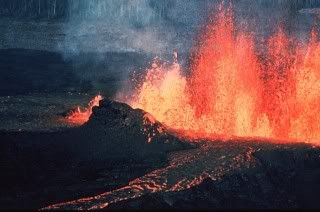Here's the deal. I have this tumor in my chest. (Anterior mediastinal mass, for the lymphoma-fluent among us.) It's pretty well reduced as I type, but at its peak, it was big enough to substantially interfere with little things like . . .oh, breathing. And circulation.
Somewhere between the discovery of the tumor and its eventual identification, I came down with, quite literally, a massive pain in the neck.
During the first days of my hospitalization, I remember sitting on a gurney and wincing as a technician ran an ultrasound probe over the ouchiest area on the left side of my throat.
"See anything?" I asked innocently.
"Oh yeah," she answered. "You've got a really big blood clot in your jugular vein."
Oh. Dear.
"Sooo," I tried to be nonchalant. "Stroke? Heart attack?"
"Oh, don't worry about anything like that," she reassured me. "It's not an artery. It's a vein."
"Really? That's goo--"
"If it moves, it'll just go into your lungs," she said brightly.
"Oh, okay. Whew." Wait. What?!
Thus began my relationship with blood thinners; the better to let the clot dissipate, my dear. Initially, "Fragmin" (dalteparin) was the treatment du jour. It's a dandy little drug, with only two disadvantages for yours truly. First of all, it's an injection. In your gut. A nuisance in the hospital, but even less fun when you're the lucky person on both ends of the syringe. Twice a day. You could play connect the dots on the bruises, trust me.
Secondly, there was a teensy financial issue. When a drug is going to cost seven hundred dollars a month after insurance pays their share, and you're not currently working for your living, it's time to seek out alternatives. And so, after groveling to my nice doctor, I was switched to warfarin pills. Warfarin is a much cheaper alternative, but taking it necessitates trundling to the local hospital every few weeks for lab work and dosage adjustments.
Problem: Warfarin makes me feel cold. Really cold. It's not an uncommon side effect and I daresay if we were smack dab in the good old summertime, I wouldn't mind. When I woke up last Friday morning, it was -19 outside. Farenheit. Sheesh. I'm not a thermostat freak, but the warmest it ever gets in the house is 68 degrees. 64 at night. To my diluted O-positive, that's downright frosty.

Solution: Dress more warmly, you say, and indeed I do. I believe in the power of layers. I have a large collection of hoodies and I always keep a warm hat nearby. Despite that, I still get the shakes periodically and have to run for a hot shower before hypothermia sets in.
Problem: There's another little condition that cropped up after a few chemo treatments.
It's called menopause.
As my doctor sympathetically explained, my body is so discombobulated from the chemotherapy that not even my ovaries know what they're supposed to be doing. I am now the proud owner of raging hot flashes. Oh, the joy!
Now a hot flash, for the uninitiated, is like being broadsided by a riptide of unbearable equatorial rainforest-type heat that instantly wrenches sweat out of every single pore in your body. It lasts for a duration of perhaps a few minutes and then it goes away, leaving you drenched and, in some cases, with your face jammed into the inner recesses of your refrigerator. I personally experience hot flashes at least a few times every hour. Sometimes, it's five or six times an hour. (And then the children can huddle around me for warmth.)
You'd think that my shivery warfarin chills and my inferno-esque flashes would cancel each other out, wouldn't you? In a just world, I should be able to exist in the not-too-hot and not-too-cold internal temperature equivalent of Baby Bear's porridge bowl. Ha.
Imagine, if you will, the experience of trying to sleep by huddling your pathetic frozen carcass under two blankets, a comforter and snuggled up next to a convenient greyhound. Gradually you start to feel marginally comfy and drift off to blissful sleep . . . only to wake up to a clanging internal alarm that indicates that steam is coming out of your ears, and makes a convincing argument at two in the morning that spontaneous combustion might be more than just an urban legend.

Instantly, you kick out from under the blankets and shove the dog off the bed*, but it's too late. You're soaked. I mean, soaked. Not just you, but everything you happen to be wearing. Also the pillowcase. And the sheets. Yuck. And just as soon as you notice how disgustingly damp you are, the flash is gone and you have leaped from Amazon humidity into Arctic permafrost.
The experienced sufferer will keep, at minimum, two fresh changes of jammies and a towel within arm's reach. Pillowcases are optional, but only because there is probably not a linen closet in the world that can keep up with a night's worth of flash 'n freeze.
It's enough to make me downright grumpy.
Oh, and according to the doctor, there's a 50/50 chance that with the cessation of chemo, I'll leave the land of menopause and resume the traditional lifestyle, as it were. If so, guess what I can look forward to in about ten years? Well, maybe I won't be on the warfarin by then.
But I bet it'll be in July.
*No greyhounds were harmed during the writing of this blog. And no, I didn't actually shove one off the bed. They're far too heavy.




No comments:
Post a Comment